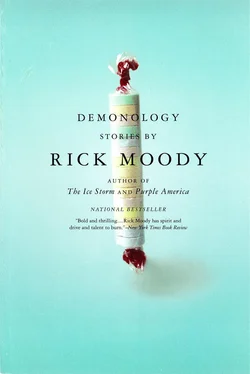* * *
This was the raw data that Glenda gave me, anyway, Sis. The arrangement of the facts is my own, and in truth, the arrangement of facts constitutes the job I was engaged to perform at the Mansion on the Hill. Because Glenda Manzini (in 1990 she married Dave Manzini, a developer from Schenectady) couldn’t really have hated her job any more than she did. Glenda Manzini, whose marriage (her second) was apparently not the most loving ever in upstate history (although she’s not alone; I estimate an even thousand divorces resulting from the conjugal rites consummated so far at my place of business), was a cynic, a skeptic, a woman of little faith when it came to the institution through which she made her living. She occasionally referred to the wedding party as the cattle; she occasionally referred to the brides as the hookers and to herself, manager of the Mansion on the Hill, as the Madame, as in, The Madame, Andrew, would like it if you would get the hell out of her office so that she can tabulate these receipts, or, Please tell the Hatfields and the McCoys that the Madame cannot untangle their differences for them, although the Madame does know the names of some first-rate couples counselors. In the absence of an enthusiasm for our product line or for business writing in general, Glenda Manzini hired me to tackle some of her responsibilities for her. I gave the facts the best possible spin. Glenda, as you probably have guessed, was good with numbers. With the profits and losses. Glenda was good at additional charges. Glenda was good at doubling the price on a floral arrangement, for example, because the Vietnamese poppies absolutely had to be on the tables, because they were so… je ne sais quoi. Glenda was good at double-booking a partic ular suite and then auctioning the space to the higher bidder. Glenda was good at quoting a figure for a band and then adding instruments so that the price increased astronomically. One time she padded a quartet with two vocalists, an eight-piece horn section, an African drumming ensemble, a dijeridoo and a harmonium.
The other thing I should probably be up-front about is that Glenda Manzini was a total knockout. A bombshell. A vision of celestial loveliness. I hate to go on about it, but there was that single strand of Glenda’s amber hair always falling over her eyes; there was her near constant attention to her makeup; there was her total command of business issues and her complete unsentimentality. Or maybe it was her stockings, always in black, with a really provocative seam following the aerodynamically sleek lines of her calves. Or maybe it was her barely concealed sadness. I’d never met anyone quite as uncomfortable as Glenda, but this didn’t bother me at first. My life had changed since the Chicken Mask.
Meanwhile, it goes without saying that the Mansion on the Hill wasn’t a mansion at all. It was a homely cinder-block edifice formerly occupied by the Colonie Athletic Club. A trucking operation used the space before that. And the Mansion wasn’t on any hill, either, because geologically speaking we’re in a valley here. We’re part of some recent glacial scouring.
On my first day, Glenda made every effort to insure that my work environment would be as unpleasant as possible. I’d barely set down my extra-large coffee with two half-and-halfs and five sugars and my assortment of cream-filled donuts (I was hoping these would please my new teammates) when Glenda bodychecked me, tipped me over into my reclining desk chair, with several huge stacks of file material.
— Andy, listen up. In April we have an Orthodox Jewish ceremony taking place at 3 P.M. in Niagara while at the same time there are going to be some very faithful Islamic-Americans next door in Ticonderoga. I don’t want these two groups to come in contact with one another at any time, understand? I don’t want any kind of diplomatic incident. Its your job to figure out how to persuade one of these groups to be first out of the gate, at noon, and its your job to make them think that they’re really lucky to have the opportunity. And Andy? The el-Mohammed wedding, the Muslim wedding, needs prayer mats. See if you can get some from the discount stores. Don’t waste a lot of money on this.
This is a good indication of Glenda’s management style. Some other procedural tidbits: she frequently assigned a dozen rewrites on her correspondence. She had a violent dislike for semicolons. I was to double-space twice underneath the date on her letters, before typing the salutation, on pain of death. I was never, ever to use one of those cursive word-processing fonts. I was to bring her coffee first thing in the morning, without speaking to her until she had entirely finished a second cup and also a pair of ibuprofen tablets, preferably the elongated, easy-to-swallow variety. I was never to ask her about her weekend or her evening or anything else, including her holidays, unless she asked me first. If her door was closed, I was not to open it. And if I ever reversed the digits in a phone number when taking a message for her, I could count on a pink slip that very afternoon.
Right away, that first A.M., after this litany of scares, after Glenda retreated into her chronically underheated lair, there was a swell of sympathetic mumbles from my coworkers, who numbered, in the front office, about a dozen. They were offering condolences. They had seen the likes of me come and go. Glenda, however, who keenly appreciated the element of surprise as a way of insuring discipline, was not quite done. She reappeared suddenly by my desk — as if by secret entrance — with a half-dozen additional commands. I was to find a new sign for her private parking space, I was to find a new floral wholesaler for the next fiscal quarter, I was to refill her prescription for birth-control pills. This last request was spooky enough, but it wasn’t the end of the discussion. From there Glenda started getting personal:
— Oh, by the way, Andy? (She liked diminutives.) What’s all the family trouble, anyway? The stuff Alex was talking about when she called?
She picked up the photo of you, Sis, the one I had brought with me. The bass at the end of your fishing rod was so outsized that it seemed impossible that you could hold it up. You looked really happy. Glenda picked up the photo as though she hadn’t already done her research, as if she had left something to chance. Which just didn’t happen during her regime at the Mansion on the Hill.
— Dead sister, said I. And then, completing my betrayal of you, I filled out the narrative, so that anyone who wished could hear about it, and then we could move onto other subjects, like Worcester’s really great semipro hockey team.
— Crashed her car. Actually, it was my car. Mercury Sable. Don’t know why I said it was her car. It was mine. She was on her way to her rehearsal dinner. She had an accident.
Sis, have I mentioned that I have a lot of questions I’ve been meaning to ask? Have I asked, for example, why you were taking the winding country road along our side of the great river, when the four-lanes along the west side were faster, more direct and, in heavy rain, less dangerous? Have I asked why you were driving at all? Why I was not driving you to the rehearsal dinner instead? Have I asked why your car was in the shop for muffler repair on such an important day? Have I asked why you were late? Have I asked why you were lubricating your nerves before the dinner? Have I asked if four G&T’s, as you called them, before your own rehearsal dinner, were not maybe in excess of what was needed? Have I asked if there was a reason for you to be so tense on the eve of your wedding? Did you feel you had to go through with it? That there was no alternative? If so, why? If he was the wrong guy, why were you marrying him? Were there planning issues that were not properly addressed? Were there things between you two, as between all the betrothed, that we didn’t know? Were there specific questions you wanted to ask, of which you were afraid? Have I given the text of my toast, Sis, as I had imagined it, beginning with a plangent evocation of the years before your birth, when I ruled our house like a tyrant, and how with earsplitting cries I resisted your infancy, until I learned to love the way your baby hair, your flaxen mop, fell into curls? Have I mentioned that it was especially satisfying to wind your hair around my stubby fingers as you lay sleeping? Have I made clear that I wrote out this toast and that it took me several weeks to get it how I wanted it and that I was in fact going over these words again when the call from Dad came announcing your death? Have I mentioned — and I’m sorry to be hurtful on this point — that Dad’s drinking has gotten worse since you left this world? Have I mentioned that his allusions to the costly unfinished business of his life have become more frequent? Have I mentioned that Mom, already overtaxed with her own body count, with her dead parents and dead siblings, has gotten more and more frail? Have I mentioned that I have some news about Brice, your intended? That his tune has changed slightly since your memorial service? Have I mentioned that I was out at the crime scene the next day? The day after you died? Have I mentioned that in my dreams I am often at the crime scene now? Have I wondered aloud to you about that swerve of blacktop right there, knowing that others may lose their lives as you did? Can’t we straighten out that road somehow? Isn’t there one road crew that the governor, in his quest for jobs, jobs, jobs, can send down there to make this sort of thing unlikely? Have I perhaps clued you in about how I go there often now, to look for signs of further tragedy? Have I mentioned to you that in some countries DWI is punishable by death, and that when Antonio at Hot Bird first explained this dark irony to me, I imagined taking his throat in my hands and squeezing the air out of him once and for all? Sis, have I told you of driving aimlessly in the mountains, listening to talk radio, searching for the one bit of cheap, commercially interrupted persuasion that will let me put these memories of you back in the canister where you now at least partially reside so that I can live out my dim, narrow life? Have I mentioned that I expect death around every turn, that every blue sky has a safe sailing out of it, that every bus runs me over, that every low, mean syllable uttered in my direction seems to intimate the violence of murder, that every family seems like an opportunity for ruin and every marriage a ceremony into which calamity will fall and hearts will be broken and lives destroyed and people branded by the mortifications of love? Is it all right if I ask you all of this?
Читать дальше












